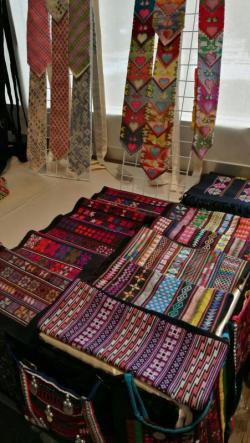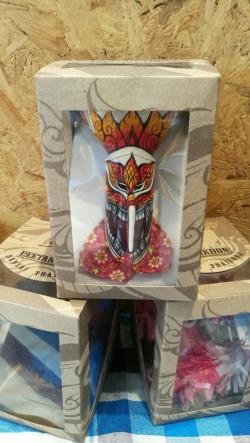
Entrepreneurship instilled from an early age with the support of the state is cultivating a crop of promising young business-minded people in their early teens, some of whom are already making a monthly salary from their products and ideas.
Showing primary and high school students the ropes about how enterprises can be built from scratch, the Education Ministry has rolled out a project designed to let young students realise their "start-up" potential. The so-called young innovative entrepreneur project has been running since 2010.
This year, it drew schools nationwide to an exhibition in Pathum Thani showcasing business models and schemes it developed that are practical and profitable.
In the process, the aspiring entrepreneurs learn through trial and error that starting and operating a business goes beyond textbook theory; they need hands-on experience, the application of local wisdom and plenty of creativity to come up with a saleable product.
The brains behind the annual exhibition is Wanpen Sujiputto, former director of the Education Ministry's Bureau of Educational Innovation Development.
The project he launched, which also provides a platform for contests to find outstanding business products, helps train valuable human resources steeped not only in academic but vocational skills.
Primary and high school students from around 600 schools nationwide have taken part in this year's project. Many brought their business projects to the exhibition this year.
Armed with well-rounded business knowledge including such diverse subjects as home economics and craftsmanship, they learn how to take control of their lives by setting up a business that affords them the opportunity to be their own boss and stand on their own two feet in the labour market.
The project also serves as a rudder to help propel Thailand toward its goal of entering the so-called "4.0" era based on a national strategy to transform the economy into one based on innovation, research and development, and higher technology.
In the exhibition, Ban Dong Samran School in Yasothon's Kut Chum district finished runner-up in the contest for woven crafts carrying the label of Dek Dong (Children of the Forest).
The handicrafts produced by the students are a medley of traditional and modern arts. Their products range from mats and handbags to dust jackets showing off intricate woven patterns.
Kaesorn Banchon, a teacher at the school credited with guiding her students to embrace local expertise when coming up with product ideas, said subjects like home economics can serve a crucial purpose but are largely overlooked by students these days.

The creative design and product innovations are put on show and for sale at the project awards. Some items are inspired by local folklore and crafts while others are reinvented to give the modern twist to them in order to create unique and popular products.
Ms Kaesorn set up a course a few years ago teaching a small group of students how to make handicrafts. Their works soon caught the eyes of other teachers and were selected for display at several school events. From there, Ms Kaesorn advised her pupils to join the young innovative entrepreneur project.
One of the handmade products even uses an indigenous Thai plant as part of its construction. Ms Kaesorn explained to her students how the plant is cultivated, selected, preserved and dyed before it is crafted into a product with a unique exterior and feel.
After senior students have become proficient in producing the crafts they pass on their knowledge to younger pupils and residents in their communities.
"Today, Ban Dong Samran School doubles as a learning centre for student craftsmanship. We are also a model school -- at least six other schools have learned handicraft production from us. Our students' products are also certified by the Industry Ministry," Ms Kaesorn said.
In Chiang Rai's Mae Fah Luang district, Ban Huai Rai Samakee School has taken part in the innovation project since 2010 with its coffee and bakery products sold under the Mon Fah Luang brand.
The school products won first prize in this year's competition.
"Many of our former students who attended the project were offered jobs in the tourism industry, such as in hotels and restaurants. Some started their own coffee shops," said school director Suppachoke Piyasan.
"Besides academic knowledge, we also focus on building a career path for our students by teaching them vocational skills," he said.
Fifty years ago, Ban Huai Rai Samakee School was attended by highlanders. It was run by the border patrol police deployed to maintain security along the fringes of the northern border. The place was later upgraded to official school status under the Doi Tung Development Project, launched by Princess Mother Srinagarindra.
Mr Suppachoke said the school zeroed in on home economics and the agricultural industry. It has acquired a level of expertise thanks to the supervision of lecturers from provincial vocational institutes including Chiang Rai Agriculture and Technology College and the Industrial and Community Education College.
One student said Mon Fah Luang coffee was designed under the concept, "More Than Coffee, An Art of Living".
Students handle all parts of the production process including "latte art" -- producing an artistic pattern and design on the surface of steamed milk froth.
The school opened its own coffee shop where students divide the labour fairly and take turns manning the business. This gives then on-the-job training in such areas as supervising others and handling delivery services.
"Revenue from the coffee shop is split up: One portion goes to the students rostered to work and the rest is deposited in a school fund to finance the coffee shop project," Mr Suppachoke said.
Also in Chiang Rai, students at another school spend time after class embroidering neckties, bags and traditional outfits to create limited-edition lines of products under the O-Yi brand. The name in local dialect means "beloved hometown".
Most students at Ban Doi Chang School in Mae Suai district are highlanders from various ethnic minority groups. The highland embroidery makes the crafts one-of-a-kind products.

Schoolgirls from Surin's Ban Kwang School take a photo with the handicrafts they produced using water hyacinths. They were among the finalists in this year's young innovative entrepreneur project award in Pathum Thani. The project, supporting entrepreneurship for young primary and high school students, has been running since 2010. photos by Nauvarat Suksamran
In Loei, Ta Khon Co Ltd was registered as a commercial entity as part of a project dubbed "Thinkable, Practicable and Saleable" run by students of Si Song Rak Wittaya School in Dan Sai district. The school also entered the young innovative entrepreneur project this year.
Popular products, sold under the Ngam Jang Loei brand, include souvenirs hand-crafted and inspired by the Phi Ta Khon festival, a fixture on the tourism calendar. The "ghost" festival is the province's ancient merit-making event where men dress up as ghosts by donning masks made from wicker utensils painted in vibrant colours.
Araya Kruahong, a student at Si Song Rak Wittaya School, serves as the company president. He said every product has a story behind it, with the students using art to bring the festival and its history to life. Each product carries a small tag explaining about the festival in Thai and English, seen as a value-added marketing flourish.
The company reports brisk sales and credits much of its success to Apirak Promraksa, a teacher skilled in wood- and glass-carving for more than 15 years.

Suppachoke Piyasan, third from left, director of Chiang Rai's Ban Huai Rai Samakee School, receives an award at the project ceremony. The school opened its own coffee shop and provides on-the-job business and service training for students who, upon graduation, had acquired skills needed to start and run their own businesses.
Aside from the knowledge gained in the classroom about business strategies, the students learn about the value of perseverance and honest business practices.
Wanpen Sujiputo, the former director of the Bureau of Education Innovation Development, helped pioneer the young entrepreneur innovation project.
He said all 600 schools that signed up to join the project were given a budget of 4.3 million baht each.
The resulting products are then whittled down and the best from 30 schools chosen to compete for prizes.
Since its inception, the project has helped hone the entrepreneurial skills of over 800 teachers, an additional 200 teaching staff and 10,000 students in primary and high schools nationwide.
Ms Wanpen said many of the students who participated in the project earn about 300 baht a month from their creations and small businesses.
"The glory of this project is that it can turn students who don't favour academic subjects into people equipped with the vocational skills to make handicrafts while also having a stage to show off their achievements," she said.
"They feel very proud when their works win awards at the provincial or national level. This project gives them a clear goal," she said.
Trirong Jenkarn, one of the judge in this year's exhibition, urged the government to inject more funding into the project.


